BMW i4 VS VW ID.7
In the increasingly competitive electric vehicle market, the BMW i4 and VW ID.7 stand out with their unique offerings. The i4 boasts a sportier driving experience, featuring BMW's renowned performance dynamics, while the ID.7 prioritizes spaciousness and practicality, appealing to family-oriented buyers. Both models incorporate cutting-edge technology, but their distinct approaches cater to different driver preferences, making this comparison a compelling choice for potential EV buyers.
BMW i4
The BMW i4 beautifully merges the dynamism of a saloon with the efficiency of an electric vehicle, offering a truly exhilarating driving experience. Its design seamlessly blends elegance and athleticism, highlighting BMW's dedication to both aesthetics and performance. Inside, the i4 boasts a high-tech cockpit that harmonises luxury with intuitive technology, allowing drivers to stay connected while on the move.
detailsVW ID.7
The VW ID.7 represents a significant step forward in Volkswagen's electric vehicle lineup, offering an elegant design combined with advanced technology features. This electric saloon showcases a sleek aerodynamic profile, prioritising both performance and efficiency. Inside, drivers will appreciate the spacious and modern cabin, equipped with intuitive controls and connectivity features for a seamless driving experience.
detailsThe rise of electric vehicles (EVs) brings forward exciting comparisons in the automotive world. Among the standout models in the EV category are the BMW i4 and the VW ID.7. Both models combine cutting-edge technology and innovative design, yet they represent different philosophies and driving experiences. Let's dive into the specifics of these two remarkable machines.
Power and Performance
The BMW i4 offers a range of power outputs, with figures varying from 286 HP up to an impressive 544 HP in its most powerful variant. Customers can choose between rear-wheel drive and all-wheel drive configurations, allowing for flexibility based on personal driving preferences. The performance of the i4 is commendable, with acceleration from 0-100 km/h achieved in as little as 3.9 seconds for the most powerful version. With a maximum speed reaching 225 km/h and a torque range up to 795 Nm, the BMW i4 is engineered for both comfort and thrill.
In contrast, the VW ID.7 provides a maximum of 340 HP and also comes in either rear-wheel or all-wheel drive layouts. The acceleration is slightly more moderate, with the fastest variant achieving 0-100 km/h in 5.4 seconds. The ID.7 is capped at a maximum speed of 180 km/h but compensates with excellent torque figures, peaking at 679 Nm. Both vehicles utilize automatic transmission through a reduction gearbox for smooth gear transitions.
Battery and Range
When it comes to battery technology, the BMW i4 has options ranging from 67.1 kWh to 81.3 kWh. The electric range is equally impressive, with distances up to 582 km on a single charge. This capability makes it a robust choice for those looking for longer journeys without frequent recharging stops.
The VW ID.7, meanwhile, takes the lead in efficiency with a smaller consumption figure of as low as 13.6 kWh/100 km. Its battery options of 77 kWh and 86 kWh provide an impressive range of up to 709 km. This longer range offers a significant advantage for drivers who prioritize longevity on the road.
Interior Design and Technology
Inside the BMW i4, one can expect a luxurious and driver-focused environment. It features high-quality materials, a sleek design, and advanced infotainment systems integrating the latest BMW iDrive technology. The spacious cabin comfortably seats five, while the 470 L trunk capacity ensures ample cargo space for travel essentials.
On the flip side, the VW ID.7 presents a surprisingly spacious interior with a focus on sustainability. The minimalist design incorporates eco-friendly materials, and the dashboard is dominated by a high-definition touchscreen with seamless connectivity options. With a trunk capacity of 532 L, it surpasses the i4, making it an excellent option for families or those needing extra storage.
Technological Innovations
Both vehicles emphasize safety and driver assistance technologies. The BMW i4 boasts advanced features like adaptive cruise control, lane-keeping assist, and a suite of pre-collision safety measures. It also features an advanced navigation system that adjusts routes based on traffic conditions and charging availability.
The VW ID.7 doesn’t lag behind, offering similar driver aids and even some unique systems. The ID.7 includes Smart Parking and a comprehensive suite of driver assistance features that can greatly enhance the driving experience, especially during urban commutes.
Conclusion
When comparing the BMW i4 to the VW ID.7, both vehicles offer compelling arguments for potential buyers. The BMW i4 excels in performance and luxury, with engaging driving dynamics. Meanwhile, the VW ID.7 shines in efficiency, practicality, and overall driving range.
Your choice ultimately hinges on personal preferences—are you looking for performance and luxury, or efficiency and space? Both models reinforce the shift towards electric mobility in their unique ways and mark a significant advancement in automotive technology.
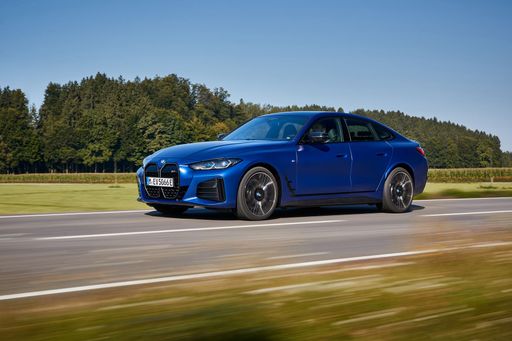 @ press.bmwgroup.com
@ press.bmwgroup.com
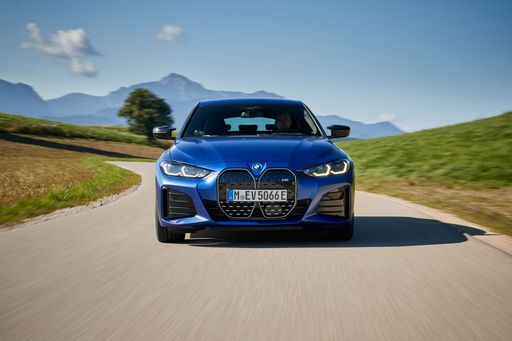 @ press.bmwgroup.com
@ press.bmwgroup.com
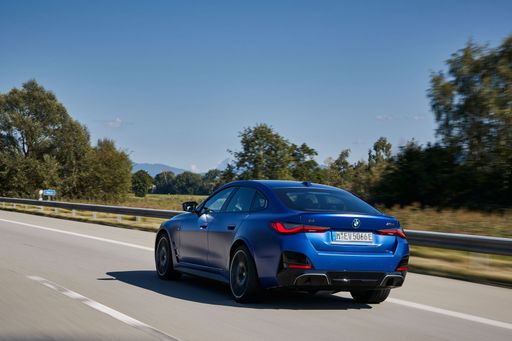 @ press.bmwgroup.com
@ press.bmwgroup.com
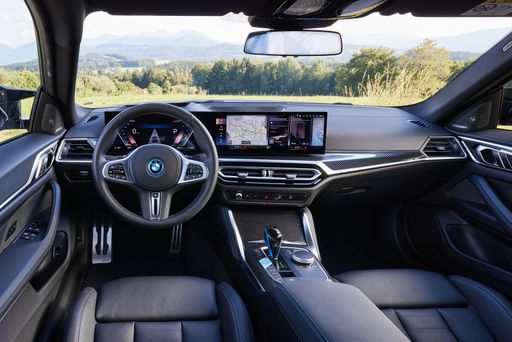 @ press.bmwgroup.com
@ press.bmwgroup.com
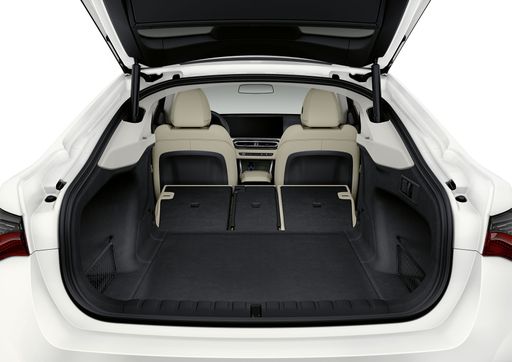 @ press.bmwgroup.com
@ press.bmwgroup.com
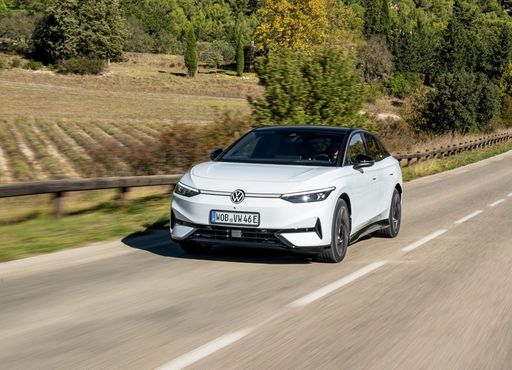 @ Volkswagen.de
@ Volkswagen.de
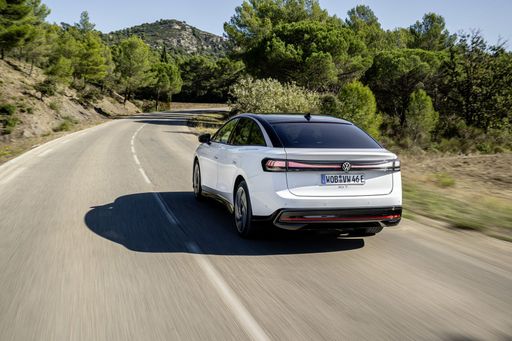 @ Volkswagen.de
@ Volkswagen.de
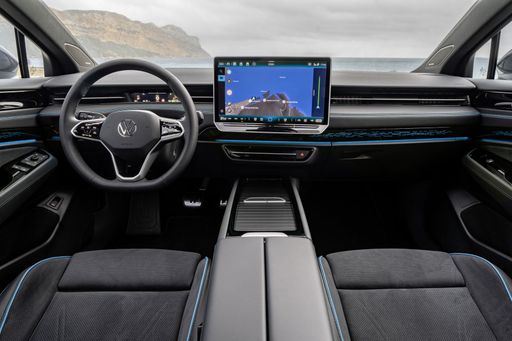 @ Volkswagen.de
@ Volkswagen.de
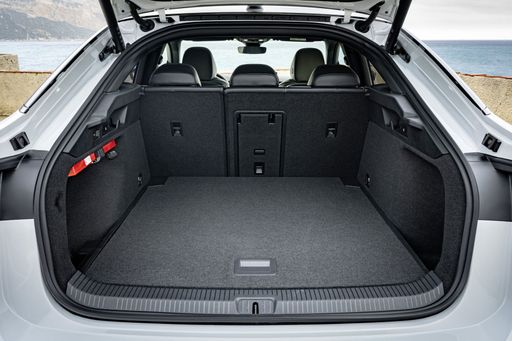 @ Volkswagen.de
@ Volkswagen.de

|

|
|
|
|
Costs and Consumption |
|
|---|---|
|
Price
about 49300 - 61800
£
|
Price
about 46300 - 54100
£
|
|
Consumption L/100km
-
|
Consumption L/100km
-
|
|
Consumption kWh/100km
15.6 - 18
kWh
|
Consumption kWh/100km
13.6 - 16.2
kWh
|
|
Electric Range
485 - 582
km
|
Electric Range
595 - 709
km
|
|
Battery Capacity
67.1 - 81.3
kWh
|
Battery Capacity
77 - 86
kWh
|
|
co2
0
g/km
|
co2
0
g/km
|
|
Fuel tank capacity
-
|
Fuel tank capacity
-
|
Dimensions and Body |
|
|
Body Type
Hatchback
|
Body Type
Hatchback
|
|
Seats
5
|
Seats
5
|
|
Doors
5
|
Doors
5
|
|
Curb weight
2075 - 2290
kg
|
Curb weight
2184 - 2328
kg
|
|
Trunk capacity
470
L
|
Trunk capacity
532
L
|
|
Length
4783
mm
|
Length
4961
mm
|
|
Width
1852
mm
|
Width
1862
mm
|
|
Height
1448
mm
|
Height
1536
mm
|
|
Payload
445 - 480
kg
|
Payload
456 - 462
kg
|
Engine and Performance |
|
|
Engine Type
Electric
|
Engine Type
Electric
|
|
Transmission
Automatic
|
Transmission
Automatic
|
|
Transmission Detail
Reduction Gearbox
|
Transmission Detail
Reduction Gearbox
|
|
Drive Type
Rear-Wheel Drive, All-Wheel Drive
|
Drive Type
Rear-Wheel Drive, All-Wheel Drive
|
|
Power HP
286 - 544
HP
|
Power HP
286 - 340
HP
|
|
Acceleration 0-100km/h
3.9 - 6
s
|
Acceleration 0-100km/h
5.4 - 6.6
s
|
|
Max Speed
190 - 225
km/h
|
Max Speed
180
km/h
|
|
Torque
400 - 795
Nm
|
Torque
545 - 679
Nm
|
|
Number of Cylinders
-
|
Number of Cylinders
-
|
|
Power kW
210 - 400
kW
|
Power kW
210 - 250
kW
|
|
Engine capacity
-
|
Engine capacity
-
|
|
Top speed
190 - 225
km/h
|
Top speed
180
km/h
|
General |
|
|
Model Year
2024
|
Model Year
2023 - 2024
|
|
CO2 Efficiency Class
A
|
CO2 Efficiency Class
A
|
|
Brand
BMW
|
Brand
VW
|
BMW i4
Exploring the Future: The BMW i4
In the ever-evolving landscape of electric vehicles, BMW has stepped forward with its state-of-the-art BMW i4. This model combines luxury, performance, and sustainability, reflecting the brand's commitment to innovation and excellence. Let's dive into the technical details and the innovative features that make the BMW i4 a noteworthy entry in the electric vehicle market.
Power and Performance Unleashed
Under the sleek bonnet of the BMW i4 lies a powerful electric motor, offering a range of performance options from 286 to an exhilarating 544 PS. With a 0 to 100 km/h acceleration time spanning between 3.9 and 6 seconds, the i4 provides a driving experience that matches its sporty exterior. The advanced powertrains offered include rear-wheel drive as well as all-wheel drive options, catering to different driving preferences.
Energy Efficiency Meets Long Range
The BMW i4 stands out not only for its performance but also for its impressive efficiency and range. The electric vehicle boasts a consumption rate ranging from 15.6 to 18 kWh per 100 km, complemented by an electrical range between 485 and 582 km. Such figures are achieved through BMW's innovative engineering and the generous 67.1 to 81.3 kWh battery capacity.
Innovation and Technology at the Core
BMW has infused advanced technology throughout the i4 to enhance both comfort and connectivity. The vehicle features state-of-the-art integration with the BMW iDrive system, providing seamless control and access to driving data, entertainment, and navigation. Furthermore, the i4 is fitted with cutting-edge driver assistance features, making every journey safer and more enjoyable.
Design and Functionality: The Perfect Balance
The aesthetically pleasing design of the BMW i4 is equally matched by its functional interior. With a 470-litre boot and the ability to comfortably seat up to five passengers, the vehicle balances practicality with style. The streamlined body measuring 4783 mm in length, 1852 mm in width, and 1448 mm in height, ensures that head-turning aesthetics are accompanied by aerodynamic efficiency.
Sustainability in Motion
Beyond performance and elegance, the BMW i4 is a testament to the brand's commitment to sustainability. As a zero-emission vehicle with a CO2 output of 0 g/km, it aligns with the global shift towards environmentally friendly transportation solutions. Furthermore, its efficient energy consumption underscores its effectiveness as a leader in electric vehicle innovation.
Conclusion: The BMW i4 – A Visionary Road Ahead
The BMW i4 is more than just an electric car; it is a sophisticated blend of cutting-edge technology, impressive range, and unparalleled performance. With its CO2 efficiency class rating of A and top-tier driving dynamics, the i4 is set to redefine the standards for electric vehicles in the luxury segment. Whether for a daily commute or a longer journey, the BMW i4 promises an exceptional driving experience while paving the way for a sustainable future.
VW ID.7
Introducing the VW ID.7: A Game-Changer in the Electric Car Market
The VW ID.7 represents Volkswagen's commitment to innovation and sustainability in the automotive market. This all-electric vehicle stands out not only for its sleek design but also for its impressive array of technological advancements. In this article, we delve into the technical specifications and innovations that make the ID.7 a remarkable addition to Volkswagen's electric vehicle lineup.
Power and Performance
Under the bonnet, the VW ID.7 is powered by a range of electric motors, offering horsepower between 286 and 340 PS. This provides the perfect blend of power and efficiency, making it an ideal choice for both city driving and long-distance journeys. With a top speed of 180 km/h and a lightning-fast acceleration from 0 to 100 km/h in just 5.4 seconds, the ID.7 doesn’t compromise on performance.
Impressive Range and Efficiency
The VW ID.7 redefines what it means to travel efficiently. Depending on the model, the ID.7 offers an electric range between 595 and 709 km on a single charge, setting new benchmarks for the industry. With energy consumption as low as 13.6 kWh per 100 km, it is one of the most energy-efficient vehicles in its class, making it both environmentally friendly and cost-effective for everyday use. The ID.7 boasts a CO2 efficiency class of A, reflecting its zero-emission status.
Advanced Technology and Safety Features
Volkswagen has equipped the ID.7 with cutting-edge technology designed to enhance the driving experience. The car features advanced driver assistance systems, including adaptive cruise control and lane-keeping assistance. Moreover, its infotainment system is state-of-the-art, offering seamless connectivity and a user-friendly interface. Safety features are also top-notch, ensuring peace of mind for drivers and passengers alike.
Design and Comfort
The ID.7's design is both futuristic and practical. Its streamlined body provides a stylish exterior, while the interior is spacious and comfortable, accommodating up to five passengers effortlessly. With a generous boot capacity of 532 litres, there is plenty of storage for all your needs. The ID.7’s dimensions, measuring 4961 mm in length and 1862 mm in width, make it a substantial vehicle that commands attention on the road.
Efficient Price Point
Despite its high-tech features and impressive performance, the VW ID.7 maintains a competitive price range, starting from €53,995. This makes it accessible to a wide range of customers seeking an eco-friendly vehicle without breaking the bank. Additionally, with monthly costs ranging between €1,197 and €1,372, it's a practical choice for those considering long-term electric vehicle ownership.
Conclusion
In conclusion, the VW ID.7 is a testament to innovation in the electric vehicle sector. Its combination of power, range, and technology sets a new standard for what drivers can expect from an electric car. As Volkswagen continues to pave the way for electric mobility, the ID.7 stands as a beacon of what's possible when cutting-edge technology meets sustainable driving practices.
